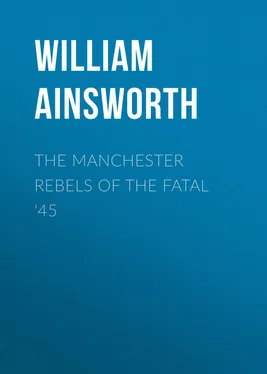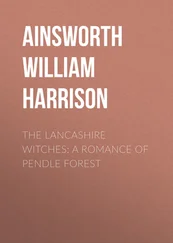William Ainsworth - The Manchester Rebels of the Fatal '45
Здесь есть возможность читать онлайн «William Ainsworth - The Manchester Rebels of the Fatal '45» — ознакомительный отрывок электронной книги совершенно бесплатно, а после прочтения отрывка купить полную версию. В некоторых случаях можно слушать аудио, скачать через торрент в формате fb2 и присутствует краткое содержание. Издательство: Иностранный паблик, Жанр: foreign_prose, на английском языке. Описание произведения, (предисловие) а так же отзывы посетителей доступны на портале библиотеки ЛибКат.
- Название:The Manchester Rebels of the Fatal '45
- Автор:
- Издательство:Иностранный паблик
- Жанр:
- Год:неизвестен
- ISBN:нет данных
- Рейтинг книги:5 / 5. Голосов: 1
-
Избранное:Добавить в избранное
- Отзывы:
-
Ваша оценка:
- 100
- 1
- 2
- 3
- 4
- 5
The Manchester Rebels of the Fatal '45: краткое содержание, описание и аннотация
Предлагаем к чтению аннотацию, описание, краткое содержание или предисловие (зависит от того, что написал сам автор книги «The Manchester Rebels of the Fatal '45»). Если вы не нашли необходимую информацию о книге — напишите в комментариях, мы постараемся отыскать её.
The Manchester Rebels of the Fatal '45 — читать онлайн ознакомительный отрывок
Ниже представлен текст книги, разбитый по страницам. Система сохранения места последней прочитанной страницы, позволяет с удобством читать онлайн бесплатно книгу «The Manchester Rebels of the Fatal '45», без необходимости каждый раз заново искать на чём Вы остановились. Поставьте закладку, и сможете в любой момент перейти на страницу, на которой закончили чтение.
Интервал:
Закладка:
"How peaceful the town looks to-night," observed Byrom. "But in a few days all will be tumult and confusion."
"I do not think any resistance will be offered to the insurgents, sir," replied Atherton; "and luckily the militia is disbanded, though I believe a few shots would have dispersed them had they attempted to show fight."
"No, there will be no serious fighting," said Byrom. "Manchester will surrender at discretion. I don't think the prince will remain here long. He will raise as many recruits as he can, and then march on. I have no right to give you advice, young sir, but I speak to you as I would to my own son. You have promised to call upon Sir Richard Rawcliffe to-morrow, and I suppose you will be as good as your word."
"Of course."
"Then take care you are not persuaded to disobey your guardian. There is a danger you do not apprehend, and I must guard you against it. Miss Rawcliffe is exceedingly beautiful, and very captivating – at least, so I have been informed, for I have never seen her. Her father has told you she is an ardent Jacobite. As such she will deem it her duty to win you over to the good cause, and she will infallibly succeed. Very few of us are proof against the fascinations of a young and lovely woman. Though Sir Richard might not prevail, his daughter will."
"I must go prepared to resist her," replied Atherton, laughing.
"You miscalculate your strength, young man," said Byrom, gravely. "Better not expose yourself to temptation."
"Nay, I must go," said Atherton. "But I should like to know something about Sir Richard Rawcliffe. Has he a son?"
"Only one child – a daughter. Besides being very beautiful, as I have just described her, Constance Rawcliffe will be a great heiress."
"And after saying all this, you expect me to throw away the chance of meeting so charming a person. But don't imagine I am presumptuous enough to aspire to a wealthy heiress. I shall come away heart-whole, and bound by no pledges stronger than those I have already given."
"We shall see," replied Dr. Byrom, in a tone that implied considerable doubt.
They had now arrived at the door of the doctor's residence – a tolerably large, comfortable-looking house, built of red brick, in the plain, formal style of the period.
Before parting with his young companion, Dr. Byrom thought it necessary to give him a few more words of counsel.
"It may appear impertinent in me to meddle in your affairs," he said; "but believe that I am influenced by the best feelings. You are peculiarly circumstanced. You have no father – no near relative to guide you. An error now may be irretrievable. Pray consult me before you make any pledge to Sir Richard Rawcliffe, or to Dr. Deacon."
There was so much paternal kindness in his manner that Atherton could not fail to be touched by it.
"I will consult you, sir," he said, in a grateful tone; "and I thank you deeply for the interest you take in me."
"Enough," replied Dr. Byrom. "I shall hope to see you soon again. Give me your impressions of Constance Rawcliffe."
He then bade the young man good-night, rang the door bell, and entered the house.
CHAPTER VII.
RENCOUNTER NEAR THE OLD TOWN CROSS
A path led across the south side of the large churchyard surrounding the collegiate church, and on quitting Dr. Byrom, Atherton took his way along it, marching past the old gravestones, and ever and anon glancing at the venerable pile, which, being completely lighted up by the moonbeams, presented a very striking appearance. So bright was the moonlight that the crocketed pinnacles and grotesque gargoyles could have been counted. The young man was filled with admiration of the picture. On reaching the western boundary of the churchyard, he paused to gaze at the massive tower, and having contemplated its beauties for a few minutes, he proceeded towards Salford Bridge.
It has already been stated that this was the oldest and most picturesque part of the town. All the habitations were of timber and plaster, painted black and white, and those immediately adjoining the collegiate church on the west were built on a precipitous rock overlooking the Irwell.
Wherever a view could be obtained of the river, through any opening among these ancient houses – many of which were detached – a very charming scene was presented to the beholder. The river here made a wide bend, and as it swept past the high rocky bank, and flowed on towards the narrow pointed arches of the old bridge, its course was followed with delight, glittering as it then did in the moonbeams.
The old bridge itself was a singular structure, and some of the old houses on the opposite side of the river vied in picturesque beauty with those near the church.
Atherton was enraptured with the scene. He had made his way to the very edge of the steep rocky bank, so that nothing interfered with the prospect.
Though the hour was by no means late – the old church clock had only just struck ten – the inhabitants of that quarter of the town seemed to have retired to rest. All was so tranquil that the rushing of the water through the arches of the bridge could be distinctly heard.
Soothed by the calmness which acted as a balm upon his somewhat over-excited feelings, the young man fell into a reverie, during which a very charming vision flitted before him.
The description given him of the lovely Constance Rawcliffe had powerfully affected his imagination. She seemed to be the ideal of feminine beauty which he had sought, but never found. He painted her even in brighter colours than she had been described by Dr. Byrom, and with all the romantic folly of a young man was prepared to fall madly in love with her – provided only she deigned to cast the slightest smile upon him.
Having conjured up this exquisite phantom, and invested it with charms that very likely had no existence, he was soon compelled to dismiss it, and return to actual life. It was time to go home, and good Widow Heywood, with whom he lodged, would wonder why he stopped out so late.
Heaving a sigh, with which such idle dreams as he had indulged generally end, he left the post of vantage he had occupied, and, with the design of proceeding to Deansgate, tracked a narrow alley that quickly brought him to Smithy Bank. The latter thoroughfare led to the bridge. Lower down, but not far from the point of junction with Deansgate, stood the old Town Cross.
Hitherto the young man had not seen a single individual in the streets since he left the Bull's Head, and it therefore rather surprised him to perceive a small group of persons standing near the Cross, to which allusion has just been made.
Two damsels, evidently from their attire of the higher rank, attended by a young gentleman and a man-servant – the latter being stationed at a respectful distance from the others – were talking to a well-mounted horseman, in whom Atherton had no difficulty in recognising Colonel Townley. No doubt the colonel had started on his journey to Lancaster. With him was a groom, who, like his master, was well mounted and well armed.
Even at that distance, Atherton remarked that Colonel Townley's manner was extremely deferential to the young ladies – especially towards the one with whom he was conversing. He bent low in the saddle, and appeared to be listening with deep interest and attention to what she said. Both this damsel and her fair companion were so muffled up that Atherton could not discern their features, but he persuaded himself they must be good-looking. A fine shape cannot easily be disguised, and both had symmetrical figures, while the sound of their voices was musical and pleasant.
Atherton was slowly passing on his way, which brought him somewhat nearer the group, when Colonel Townley caught sight of him, and immediately hailed him.
Читать дальшеИнтервал:
Закладка:
Похожие книги на «The Manchester Rebels of the Fatal '45»
Представляем Вашему вниманию похожие книги на «The Manchester Rebels of the Fatal '45» списком для выбора. Мы отобрали схожую по названию и смыслу литературу в надежде предоставить читателям больше вариантов отыскать новые, интересные, ещё непрочитанные произведения.
Обсуждение, отзывы о книге «The Manchester Rebels of the Fatal '45» и просто собственные мнения читателей. Оставьте ваши комментарии, напишите, что Вы думаете о произведении, его смысле или главных героях. Укажите что конкретно понравилось, а что нет, и почему Вы так считаете.












